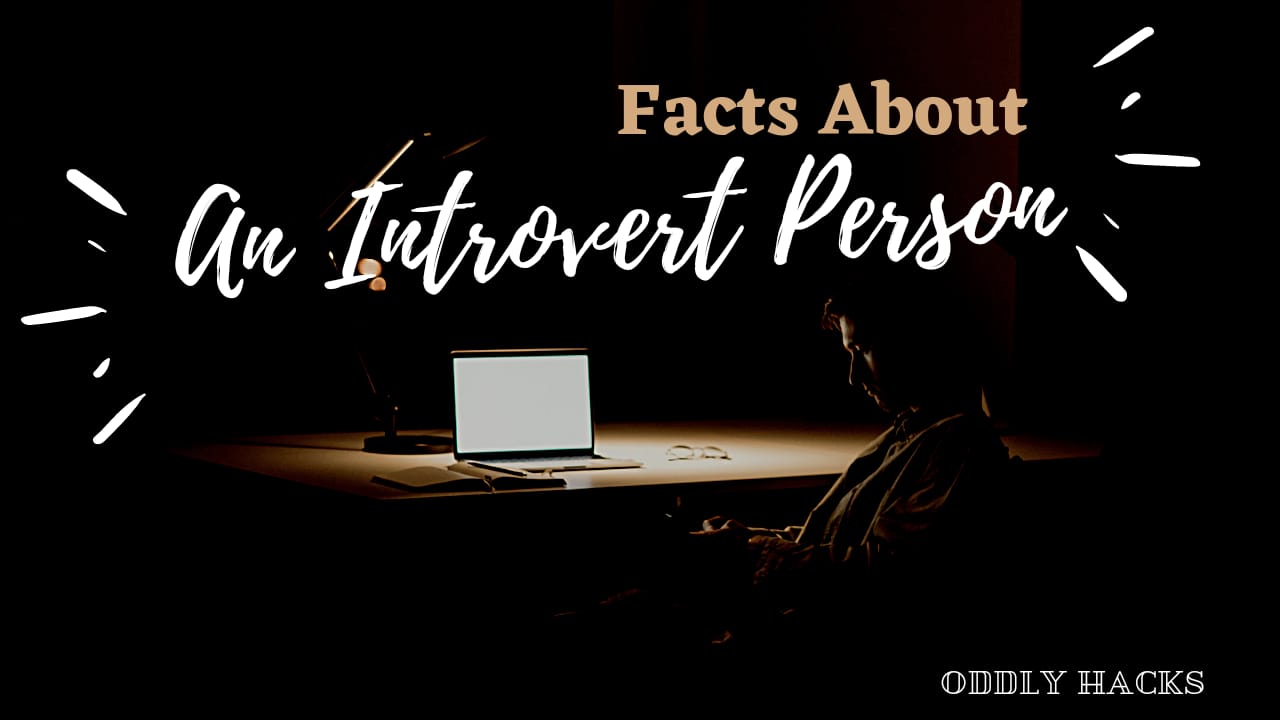We all have come across some people who are just astoundingly unsocial about their feelings, and very unapologetic about their, often considered rude, behavior. And when you are dealing with this sort of people, you are dealing with an introvert person. There’s no malice, hate, or malice behind their behavior; it’s just the way they are. But, there’s a catch, every introvert person is not the same, and still, they have some similar qualities which give them away as an introvert person.

What is an Introvert Person?
Introversion is one of the major personality traits identified in many theories of personality.
Introverts tend to be circled more on internal thoughts, or inward turning, moods and feelings rather than seeking out external stimulation.
Introversion is viewed as existing as part of a continuum along with extroversion. Introversion and extroversion indicates two ends of a scale.
The terms introversion and extroversion, also spelt as extraversion, were popularized through the work of Carl Jung and later became pivotal parts of other popular theories, including the big five theory of personality. The introversion-extroversion dimension is also one of the four areas identified by the MBTI or Myers-Briggs Type Indicator. According to many theories of personality, everyone has some degree of both introversion and extroversion. However, people often tend to lean one way or the other.
An introvert person tends to evade attending parties or spending time in a large gathering, introverts often feel a need to recharge by spending a period of time alone.
Down below we take a look at the types of introverts and what qualities make them an introvert.

4 Types of Introverts
A survey conducted by researcher Jonathan Cheek of approximately 500 participants of the age group 18-70 revealed that it is quite impossible for only one type of introvert to exist. There’s a short acronym called STAR that covers all the 4 types of introverts that exist.
1. Social: The most commonly known introversion is Social Introversion. Social introverts prefer small groups rather than bigger ones or may prefer solitude, though not on a permanent basis. They are the kind who avoid attending parties at all costs. However, their behavior is not to be with shyness because anxiety is not the driving force being the need for solitude.
2. Thinking: This one is a more recent concept of introversion today. Self-reflective, thoughtful and introspective, they are daydreamers full of rich imagination and creativity. They differ from the social ones as they do not feel the extreme need of staying away from social gatherings all the time.
3. Anxious: Because of a sense of awkwardness and self-consciousness, they seek solitude. Anxious introverts feel an extreme painful shyness in large gatherings, unlike social introverts. And their anxiety haunts them even in solitude because they overthink about what was and what could have been.
4. Restrained: The identifiers of this category prefer to take their time when making a decision or even before speaking. They also come off as very reserved and take time to do things because they try their best to not let impulse affect their decision making.
Qualities of An Introvert

Introverts hate small talk
Introverts feel disinterested in other people because small talk is not their forte. And they only dread it because they value honest interactions and want to feel connected. Authenticity means for them to make connections, and meaningful and deep conversations are what help them lower their walls.
Quiet should not be confused with shyness
Introversion, social anxiety, and shyness are three things apart and should not be confused with each other. Introverts don’t have an interest in talking, although there are many introverts who experience anxiety and shyness with it. They tend to be reserved and like to get to know the person approaching them before they open up about themselves.
Introverts need alone time to recharge
As mentioned in #1, introverts need alone to get themselves together before they are ready to face the world again. Social gatherings can be draining for introverts to the extent that they might behave rudely to anyone that approaches them. Introverts behave in such a way because they respond differently to rewards than extroverts. The rewards include social status, money, food, and sex. Introverts do care about all of these things but need to recharge themselves to respond enthusiastically to them. While extroverts thrive and also excessively pursue these rewards, an introvert person, on the other hand, is very much less driven by these.
They are not angry or depressed
Often introverts feel overwhelmed by socializing on a daily basis and need some quiet time for themselves to recharge. But, people at times dub this as a negative emotion and confuse it with being depressed or angry. If you are an introvert in a family where it is not seen as a personality trait, you might have often been told to “try to be happy” or “stop sulking for nothing” when all that was happening was you seeking a little solitude.
Introverts don’t want to be alone all the time

Some alone time each day is necessary for introverts to gains back their social energy, but it does not affirm that they desire to be isolated all the time. Even the time spent with family and close friends can be draining. Hence, one needs quiet time to release the build-up and recover their social energy bar.
Low self-esteem is not the cause of introversion
Often dubbed as low self-esteem or lack of self-confidence, introverts are actually quiet and reserved. And it can be overwhelming for introverted kids who are pressurized by their adults to open up more as an attempt to cure them.
Kids subjected to constant feedback from their adults begin to think that there is something fundamentally wrong with themselves. They may develop a habit to question themselves as a result.
Introversion is not a disease that needs to be fixed
In our society, introversion is often dubbed as something that needs to be overcome. Many introverts report that teachers or adults forced them into an environment where they felt overwhelmed or stressed.
Their actions follow as “You are very shy for no reason; this will help you open up a bit”. But introversion is not a mental illness that you get over form. Of course, they need to address social anxiety and shyness , especially if they become a cause of hindrance and distress in daily life.
They dislike attention seekers
An introvert person cannot contemplate why anyone would do something just to get the attention of others. They easily get annoyed by people who fake themselves to get attention.
Introverts are deep thinkers, which enables them to be great motivational speakers. Ironically, as much as they would like to teach crowds of people, they might evade the after-interactions and catching up.
They need to get out every once in a while
It is unfair to assume that an introvert person likes to be alone all the time because they are humans are social beings. So, every once in a while, you spot these rare-to-be-seen creatures catching sights.
However, the idea of superficial friendship or small talk is not very enticing to them. Hence, alone time is necessary for them to recharge and bear the brunt of small talk

